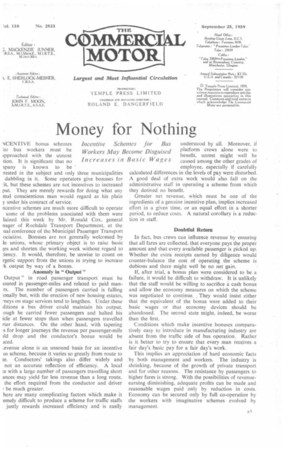Money for Nothing
Page 37

If you've noticed an error in this article please click here to report it so we can fix it.
sICENTIVE bonus schemes Or bus workers must be pproached with the utmost tion. It is significant that no -ipany is known to be !rested in the subject and only three municipalities dabbling in it. Some operators give bonuses for it. but these schemes are not incentives to increased put. They are merely rewards for doing what any mal conscientious man would regard as his plain y under his contract of service.
ncentive schemes are much more difficult to operate some of the problems associated with them were lained this week by Mr. Ronald Cox, general nager of Rochdale Transport Department,. at the ual conference of the Municipal Passenger Transport ()dation. Bonuses are not generally welcomed by le unions, whose primary object is to raise basic es and shorten the working week without regard to iency. It would, therefore, be unwise to count on rgetic support from the unions in trying to increase -lc output by way of a bonus.
Anomaly in " Output " Output" in road passenger transport must be tsured in passenger-miles and related to paid manrs. The number of passengers carried is falling [onally but, with the erection of new housing estates, rneys on stage services tend to lengthen. Under these ditions a bus driver could maintain his output, ough he carried fewer passengers and halted his icle at fewer stops than when passengers travelled rter distances. On the other hand, with tapering s for longer journeys the revenue per passenger-mile ild drop and the conductor's bonus would be iced.
,evenue alone is an unsound basis for an incentive us scheme, because it varies so greatly from route to te. Conductors' takings also differ widely and not an accurate reflection of efficiency. A local Le with a large number of passengers travelling short ances may yield far less revenue than a long route, the effort required from the conductor and driver / be much greater.
here are many complicating factors which make it ernely difficult to produce a scheme for traffic staffs justly rewards increased efficiency and is easily. understood by all. Moreover, if platform crews alone were to benefit, unrest might well be caused among the other grades of employee, especially if carefully calculated differences in the levels of pay were disturbed. A good deal of extra work would also fall on the administrative staff in operating a scheme from which they derived no benefit.
Greater net revenue, which must be one of the ingredients of a genuine incentive plan, implies increased effort in a given time, or an equal effort in a shorter period, to reduce costs. A natural corollary is a reduction in staff.
Doubtful Return In fact, bus crews can influence revenue by ensuring that all fares are collected, that everyone pays the proper amount and that every available passenger is picked up. Whether the extra receipts earned by diligence would counter-balance the cost of operating the scheme is dubious and there might well be no net gain. • If, after trial, a bonus plan were considered to be a failure, it would be difficult to withdraw. It is unlikely that the staff would be willing to sacrifice a cash bonus and allow the economy measures on which the scheme was negotiated to continue. They would insist either that the equivalent of the bonus were added to their basic wages or that economy devices should be abandoned. The second state might, indeed, be worse than the first.
Conditions which make incentive bonuses comparatively easy to introduce in manufacturing industry are absent from the traffic side of bus operation. Rather is it better to try to ensure that every man receives a fair day's basic pay for a fair day's work.
This implies an appreciation of hard economic facts by both management and workers. The industry is shrinking, because of the growth of private transport and for other reasons. The resistance by passengers to higher fares is strong. With the possibilities of revenueearning diminishing, adequate profits can be made and reasonable wages paid only by reduction in costs. Economy can be secured only by full co-operation by the workers with imaginative schemes evolved by management.




















































































































